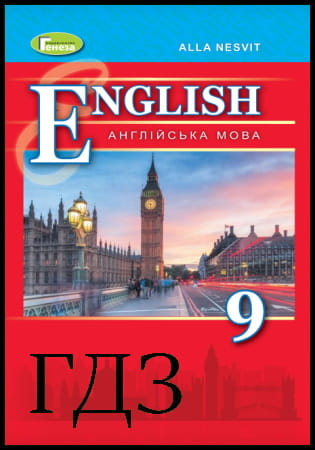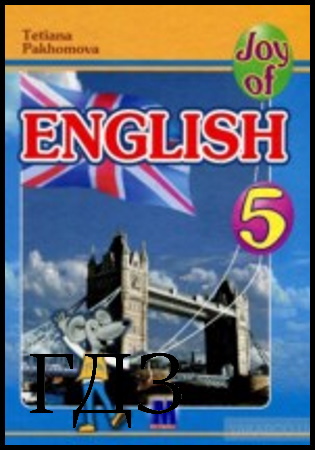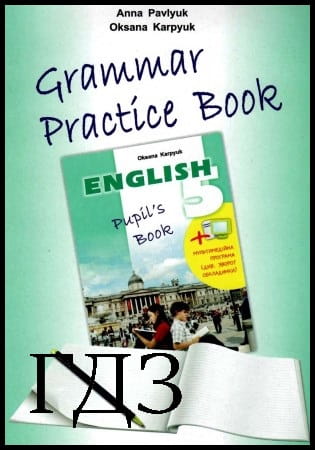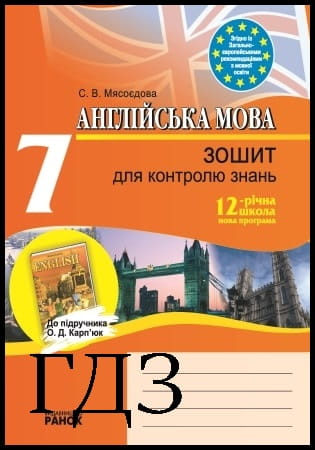ГДЗ Англійська мова 6 клас. Робочий зошит Prepare [Куки Керолайн, Сміт Кетрін] 2023
Unit 2. This is my day
Сторінка 121. Complete the phrases with the verbs in the box.
0. clean your teeth;
1. leave tidy your room;
2. the house;
3. wake up;
4. have breakfast;
5. check your messages;
6. get dressed;
7. prepare your school bag;
8. put on your shoes;
9. brush your hair.
2. Match the phrases in Exercise 1 to the photos.
1 - wake up; 2 - get dressed; 3 - have breakfast; 4 - check your messages; 5 - tidy your room; 6 - prepare your school bag; 7 - brush your hair; 8 - clean your teeth; 9 - put on your shoes; 10 - leave the house.
3. Complete the text with the correct form of phrases in Exercise 1.
Hi, I'm Keisha and this is my morning routine. On school days, I usually wake up at 7 o'clock. Before I get out of bed, check my messages on my phone. Then, have breakfast in the kitchen with my parents. I get dressed in my room. I usually wear jeans and a T-shirt. Then, I clean my teeth (I do this at least twice a day and after every meal!) and brush my hair. After, I prepare my school bag: I take my homework, books, lunch and my phone - that's very important! Then, I put on my shoes and leave the house at 8 o'clock. I always walk to school with my friend Lucas.
3. Complete the sentences with the present simple or present continuous form of the verbs in brackets.
1. I never tidy my room. My mum hates it!
2. They usually watch films at the weekend.
3. My dad is cooking breakfast today.
4. My mum doesn't work in a school. She's a police officer.
5. Jack isn't working today because he's not very well.
6. What book are you reading at the moment? Is it good?
4. Correct the mistakes in the sentences.
1.1 am studying now because I've got an exam tomorrow.
2. Do you knowing Katy? She's my sister.
3. My brother js watching TV with his friends.
4. My mum is a doctor. She Is usually works at weekends.
5. Every day we are drinkteg tea for breakfast.
Сторінка 13
Grammar
1. Look at the example sentences a and b. Then complete the rules below with the phrases in the box.
We use the present simple to talk about habits and routines. We often use it with adverbs of frequency. We use the present continuous to talk about things we're doing now. We often use it with words like today, now and at the moment.
2. Choose the correct words or phrases to complete the sentences.
1. I always prepare my school bag before school.
2. My parents always watch TV in the evening.
3. My brother is making breakfast now.
4. Why have you got your maths book? We're studying English today.
5. What are you doing at the moment?
6. I don't never go to bed at 9 o'clock.
Сторінка 14
Reading
1. Read the texts. For each question, write A (Anna), L (Lena) or Y (Yuko).
1. Who has a hot drink in the morning? - Yuko.
2. Who uses the computer in the evening? - Lena.
3. Who goes to school by bus or car? - Anna.
4. Who does sport in the afternoon? - Yuko.
5. Who can't choose what she wears to school? - Yuko.
6. Who goes home before 2 p.m.? - Lena.
7. Who takes her lunch to school7 - Anna.
2. Read the texts again and answer the questions.
1. She has cereal and milk.
2. She walks.
3. It starts at 7.30 am.
4. She usually has sandwiches and fruit.
5. She watches videos on the internet.
6. She does her homework in the evening.
2. Look at the text again. Find and underline sentences with and, but and or. Then complete the rules with and, but and or.
1. We use and to link two ideas.
2. We use but to contrast two things.
3. We use or for different things we can choose.
3. Complete the sentences with and, but and or.
1. I walk to school with my friends Slava and Hnat.
2. Do you go to school at 8 o'clock or at 8.30?
3. For breakfast, I have cereal, but I don't have toast.
4. I have tea or hot chocolate. I don't have both.
5. I like football, but I don't like basketball.
6. In the evening, I do my homework then and I watch TV.
4. Think about the activities you do in a typical day and what time you do them. Use the ideas in Exercise 1 and your own ideas. Make notes below.
7.15 - get up;
7.30 - have breakfast;
7.45 - get dresses;
8.00 - go to school;
13.00 - have lunch;
15.00 - go home;
17.00 - play football;
19.00 - have dinner and go for a walk with friends;
21.00 - go to bed.
5. Write a paragraph about a typical school day. Use the notes you made in Exercise 4 and write about 50 words. Remember to use and, but and or in your text.
I get up at 7.15 do washing and brush my teeth. At 7.30 I have my breakfast, at 7.45 I get dressed and at 8.00 go to school. At 13.00 I have my lunch at school and at 15.00 go home after classes. At 17.00 I go to play football with my team. At 19.00 I have dinner with my family and go for a walk with friends. At 21.00 I go to bed.
Сторінка 15
Listening
1. Listen to the conversation between Jasmine and George. Where are they?
They are in the supermarket.
2. Listen again. Who says what? Write 'J' (Jasmine) or 'G' (George).
1 - J; 2 - J; 3 - G; 4 - G; 5 - G; 6 - J.
1. I'm shopping for my parents. - Jasmine.
2. I thought you always play football on Saturday afternoon. - Jasmine.
3. There isn't any football today. - George.
4. Well, actually, I love chips too. - George.
5. I like chocolate, but I don't eat it often. - George.
6. I never eat chocolate. - Jasmine.
3. Listen again and choose the correct answers.
1. Jasmine's mum is working at the moment.
2. The people in the football team are on holiday.
3. George's sister wants to make eggs.
4. George's sister wants to have lunch at 1.30 p.m.
5. Jasmine wants to buy chocolate.
6. Jasmine's dad likes chocolate.
Writing
1. Read the text and match the times to the activities.
1. 7.00 a.m. - d. get dressed.
2. 8.00 a.m. - e. leave the house.
3. 8.30 a.m. - f. start school.
4. 1.00 p.m. - g. have lunch.
5. 3.00 p.m. - b. go home.
6. 7.30 p.m. - a. have dinner.
7. 9.30 p.m. - c. go to bed.
 ГДЗ Робочий зошит Англійська мова Зошит 2023 Сміт Куки 6 клас Лінгвіст
ГДЗ Робочий зошит Англійська мова Зошит 2023 Сміт Куки 6 клас Лінгвіст
 Якщо помітили в тексті помилку, виділіть її та натисніть Ctrl + Enter
Якщо помітили в тексті помилку, виділіть її та натисніть Ctrl + Enter 22.11.2023,
22.11.2023,
 13 541,
13 541,
 0
0
 Назад
Назад




![ГДЗ Природознавство 5 клас. Підручник [Ярошенко О.Г., Бойко В.М.] 2018 ГДЗ Природознавство 5 клас. Підручник [Ярошенко О.Г., Бойко В.М.] 2018](/uploads/posts/2019-04/1555779316_5_p_y_u2018.jpg)
![ГДЗ Основи правознавства 9 клас. Підручник [Наровлянський О. Д.] 2017 ГДЗ Основи правознавства 9 клас. Підручник [Наровлянський О. Д.] 2017](/uploads/posts/2019-02/1550928122_9k_p_n_2017.jpg)
![ГДЗ Українська мова 8 клас. Підручник [Глазова О.П.] 2021 ГДЗ Українська мова 8 клас. Підручник [Глазова О.П.] 2021](/uploads/posts/2021-10/1633720388_8k_y_g_2021.jpg)
![ГДЗ Вступ до історії 5 клас. Підручник [Гісем О.В.] 2018 ГДЗ Вступ до історії 5 клас. Підручник [Гісем О.В.] 2018](/uploads/posts/2019-07/1564163269_5k_i_h_2018.jpg)